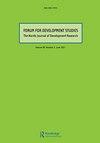初级产品专业化、工业化和加纳经济发展
IF 1.1
Q3 DEVELOPMENT STUDIES
引用次数: 0
摘要
摘要本文考察了加纳对初级产品的持续依赖是否有助于其经济增长,并且这种经济增长将长期持续。这表明,加纳自20世纪90年代以来的经济增长可归因于一系列财富,严重依赖少数初级产品不会带来可持续发展。加纳的经验提供了重要的政策影响。结构改革,如精心设计的产业政策,将是长期经济发展所必需的。对加纳来说,工业化自20世纪80年代以来一直没有进展。基础设施无法支持制造业的发展,高等教育也不合适,尤其是在科学和工程方面。鉴于资源有限,将重点放在选定的工业区是有意义的。需要为稳定的电力供应做好准备,并减少汇率波动。根据加工阶段修改关税结构和积极利用出口激励计划将是有益的。政府将关注农产品加工业、纺织服装业、铝生产和石油化工的进一步发展。本文章由计算机程序翻译,如有差异,请以英文原文为准。
Specialization in Primary Products, Industrialization and Economic Development of Ghana
Abstract This paper examines whether Ghana's continuing reliance on primary products has contributed to its economic growth and such economic growth would be sustained in the long run. It shows that Ghana's economic growth since the 1990s can be attributed to a series of fortunes and heavy reliance on a few primary products will not lead to a sustainable development. The experience of Ghana provides important policy implications. Structural reforms, such as a well-designed industrial policy, would be needed for the long run economic development. For Ghana, industrialization did not progress since the 1980s. The infrastructure could not support the manufacturing development and the tertiary level education is not appropriate, particularly in science and engineering. Focusing on selected industrial estates would be meaningful in light of the limited resources. It is needed to prepare a stable supply of electricity and to reduce an exchange rate volatility. A modification of tariff structure depending on the stages of processing and an active utilization of export incentive schemes would be helpful. The government is to pay attention to a further development of the agro-processing industry, textiles and garments industry, aluminum production and the petrochemical industry.
求助全文
通过发布文献求助,成功后即可免费获取论文全文。
去求助
来源期刊

FORUM FOR DEVELOPMENT STUDIES
DEVELOPMENT STUDIES-
CiteScore
1.80
自引率
14.30%
发文量
24
期刊介绍:
Forum for Development Studies was established in 1974, and soon became the leading Norwegian journal for development research. While this position has been consolidated, Forum has gradually become an international journal, with its main constituency in the Nordic countries. The journal is owned by the Norwegian Institute of International Affairs (NUPI) and the Norwegian Association for Development Research. Forum aims to be a platform for development research broadly defined – including the social sciences, economics, history and law. All articles are double-blind peer-reviewed. In order to maintain the journal as a meeting place for different disciplines, we encourage authors to communicate across disciplinary boundaries. Contributions that limit the use of exclusive terminology and frame the questions explored in ways that are accessible to the whole range of the Journal''s readership will be given priority.
 求助内容:
求助内容: 应助结果提醒方式:
应助结果提醒方式:


